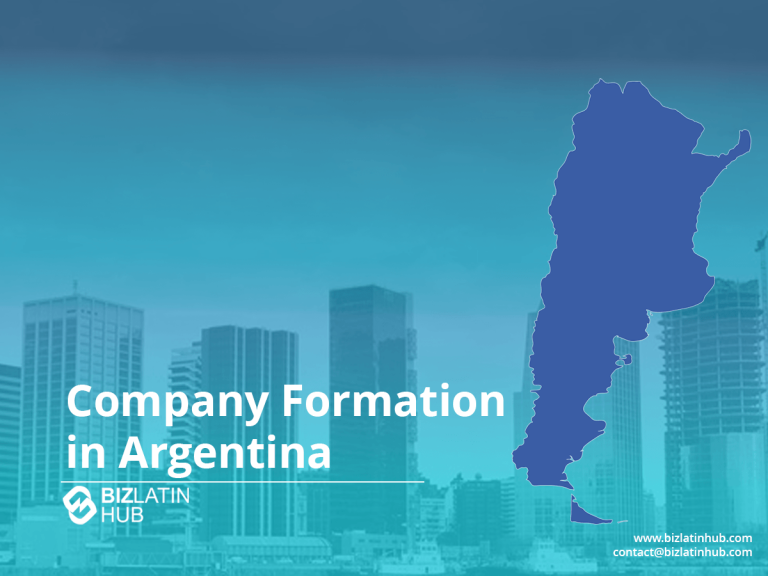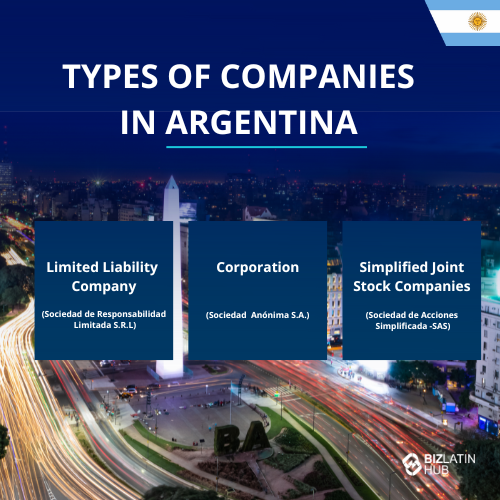What to expect: If you wish to withdraw your consent and stop hearing from us, simply click the unsubscribe link at the bottom of every email we send or contact us at social@bizlatinhub.com. We value and respect your personal data and privacy. To view our privacy policy, please visit our website. By submitting this form, you agree that we may process your information in accordance with these terms.

Company Incorporation in Argentina: a How-to Guide
Company incorporation in Argentina is gaining traction among foreign investors, thanks to its large, diversified economy, a thriving services sector, and a well-educated middle class. As the country continues to open-up, this guide assists investors in the process of starting a business in Argentina. Biz Latin Hub is here to support you every step of the way, providing our full suite of back-office services to help register a business in Argentina, maintain your commercial operations, and act as your trusted local partner.
Key Takeaways
| Foreign Ownership: | Non-nationals and legal entities are able to own and operate businesses in Argentina. |
| 8 Steps to Incorporate in Argentina: | Step 1: Draft the POA’s to obtain shareholders’ Tax ID. Step 2: Draft POAs to incorporate the company. Step 3: Draft your Company Bylaws. Step 4: Registration in the Public Commercial Registry. Step 5: Obtaining the registration certificate. Step 6: Registration with the Tax Authority (AFIP). Step 7: Opening a bank account. Step 8: Register the Company Books. |
| Common Types of Companies: | Sociedad de Responsibilidad Limitada (Limited Liability Comapny LLC). Sociedad Anónima S.A. (Corporation). Sociedad por Acciones Simplificada, S.A.S (Simplified Joint Stock Company). |
| Minimum Requirements: | Three possible names for the legal entity. Minimum of (2) shareholders. Outlined business activity. Initial Contribution of Social Capital (suggested: USD$ 2,000). An Argentinian address. |
| Documents Needed: | Shareholders’ ID. Statutory appointments. Fiscal address. |
How to Incorporate a Company in Argentina in 8 Steps
Follow these eight steps to complete company incorporation in Argentina:
- Step 1: Draft the POA’s to obtain shareholders’ Tax ID.
- Step 2: Draft POAs to incorporate the company.
- Step 3: Draft your Company Bylaws.
- Step 4: Registration in the Public Commercial Registry.
- Step 5: Obtaining the registration certificate.
- Step 6: Registration with the Tax Authority (AFIP).
- Step 7: Opening a bank account.
- Step 8: Register the Company Books.
Step 1: Draft the POAs to Obtain Shareholders’ Tax ID
Shareholders will obtain a personal Tax ID from AFIP (Administración Federal de Ingresos Públicos), which is the tax authority in Argentina. It’s important to consider that companies with foreign shareholders will have to take an additional step before starting the incorporation process in Argentina.
The foreign company must be registered with the General Inspectorate of Justice (IGJ) and must also obtain a tax identification number called Clave de Identificación (CDI).
Step 2: Draft POAs to incorporate the company
Shareholders will grant a second POA to register the new company before local authorities. Travel to Argentina is not necessary as the POA’s apostille will suffice.
Step 3: Draft your Company Bylaws
Also known as a social contract, your company’s bylaws contain the agreements reached by the shareholders to incorporate the company. The articles of incorporation must be drafted by a public notary.
Step 4: Registration in the Public Commercial Registry
Once the articles of incorporation have been drafted, the company must be registered in the Public Commercial Registry. Currently, foreign entities have to prove economic activity abroad, usually using financial statements.
However, on July 16, 2024, General Resolution No. 15/2024 was published in the Official Gazette, which will come into effect on November 1, 2024, eliminating the requirement to prove economic activity abroad, thereby exempting foreign entities from this obligation. This decision was made as part of the current government’s efforts to ease foreign investments.
Step 5: Obtaining the registration certificate
Once the company is registered in the Public Commercial Registry, the company will receive a registration certificate. The registration certificate is the document that proves the legal existence of the company.
Step 6: Registration with the Tax Authority (AFIP)
The company must register with the AFIP to comply with its tax obligations, register the fiscal address, and obtain the company tax ID certificate.
Step 7: Opening a bank account
The new company must open a bank account in its name. The bank account will be used for all business purposes.
These banks offer a range of services tailored to businesses, including corporate banking, lending, and financial advisory, making them potential options for companies looking to establish a presence in Argentina:
- Banco Santander Río.
- Banco de la Nación Argentina (BNA).
- Banco Galicia.
- Banco BBVA Argentina.
- Banco Macro.
- Banco Itaú Argentina.
Step 8: Register the Company Books
Register the company’s accounting books (balance, journal, and inventory). You must also submit any other books with minute notes on meetings, information about the board, deposit of shares, and record of actions.
Company Incorporation in Argentina: Which Entity to Choose?
With a gross national income (GNI) of $12,520 in 2023 and receiving USD $15.41 billion in 2022 in foreign direct investment reaching now is an opportune time to explore company incorporation in Argentina. When incorporating a company in Argentina, there are three main types of companies in Argentina that foreign investors tend to choose from:

- A limited liability company (Sociedad de Responsabilidad Limitada S.R.L. LLC).
- Corporation (Sociedad Anónima, S.A).
- Simplified Joint Stock Company (Sociedad por Acciones Simplificada, S.A.S).
Each one carries its own advantages and drawbacks, and the best choice will depend on the needs of your business and its intended structure. Getting in contact with a company formation agent in Argentina is advised.
1. Sociedad de Responsabilidad Limitada S.R.L. Limited Liability Company
Investors often choose an LLC (known as Sociedad de Responsabilidad Limitada S.R.L.) since they can own it entirely and establish it with a minimum suggested capital of just USD$2,000. At the time of establishing the LLC, only 25% of the capital can be contributed. The remaining capital must be substantiated over the following two years. To establish an LLC in Argentina you need a minimum of two shareholders up to a maximum of fifty. Each shareholder’s liability is restricted to what they initially contributed to the company’s shareholding. The capital contributed by the quota holders is divided into quotas or participations. Each partner can acquire the quantity of quotas they desire, and their liability will be limited solely to that acquisition.
2. Corporation (Sociedad Anónima- S.A.)
An S.A. (Sociedad Anónima) is formed through the creation of bylaws, which are subsequently registered with the Inspectorate General of Justice (Inspección General de Justicia or IGJ). This type of entity allows the registration of diverse business activities and is generally associated with large businesses.
Shareholders are not personally liable for the debts and obligations of the company, but only up to the extent of their contributions. The social capital is divided into shares and at least 25% of the value of each share must be subscribed to and paid.
The shares of a Sociedad Anónima are freely transferable, facilitating the entry or exit of new shareholders, and also can issue shares and be listed on the stock market, providing the opportunity to obtain financing through the sale of shares.
3. Simplified Joint Stock Companies- Sociedad de Acciones Simplificada -SAS
An S.A.S. requires only one investor and is straightforward to set up. Liability is also restricted to the initial contribution to the company’s shareholding. The S.A.S. is particularly suited for small-sized companies and entrepreneurs. Due to its streamlined processes, it may not be the ideal choice for medium to large-scale projects. For those, other legal structures like S.A. or S.R.L. might be more suitable, offering greater flexibility and complexity to handle larger business endeavors.
This type of company is the simplest and fastest way for a business to establish a company and has emerged following the Entrepreneurship Law. It is geared towards small businesses, given its straightforward constitution requirements and lower costs compared to S.A. and S.R.L.
Regarding organization, partners will only limit their liability to the capital they contribute. An S.A.S. can be established as a sole proprietorship (with a sole shareholder) or with multiple shareholders which can be legal entities and individuals.
| Summary: Types of entities | ||
|---|---|---|
| There are three main types of entities: – S.R.L Limited Liability Company – Corporation (Sociedad Anónima- S.A.) – Simplified Joint Stock Companies – Sociedad de Acciones Simplificada -SAS | ||
| Sociedad de Responsabilidad Limitada S.R.L. Limited Liability Company | ||
| Investors can own it entirely and establish it with a minimum suggested capital of USD$2,000. | To establish an SRL in Argentina you need a minimum of (2) two shareholders up to a maximum of (50) fifty. | |
| Corporation (Sociedad Anónima- S.A.) | ||
| It is formed through the creation of bylaws | The shares of a Sociedad Anónima are freely transferable | |
| Simplified Joint Stock Companies- Sociedad de Acciones Simplificada -SAS | ||
| The S.A.S. is particularly suited for small-sized companies and entrepreneurs. | This type of company is the simplest and fastest way for a business to establish a company | |
What are the minimum requirements to incorporate a company in Argentina?
In order to incorporate a company in Argentina, there are some basic minimum requirements that must be met. These include the following:
- Three possible names for the legal entity, the chosen name must not be misleading or similar to existing company names.
- Shareholders’ identification documents with minimum of (2) shareholders and up to a maximum of (50)
- Business activity, corporate purpose, and primary operations.
- Initial Contribution of Social Capital (suggested: USD$ 2,000).
- An Argentinian address.
What documents do you need to start a company in Argentina?
These are the 3 documents you must have to start a company in Argentina:
- Shareholders’ identification
- Statutory appointments
- Fiscal address.
1. Shareholders’ Identification
Shareholders need to provide identification documentation. In the event that a shareholder is an individual (natural person), individual identification and proof of address will be required. Where the shareholder is a legal entity (legal person), there will be a requirement to provide corporate documentation such as certificate of good standing, copy of company bylaws, proof of activity and company address.
Our recommendation: Where the shareholder does not possess residency within Argentina, then there is a requirement for the appointment of a legal representative to represent the shareholder.
2. Statutory Appointments
Within the incorporation process, there is a requirement to appoint a local Principal Director and a Substitute Director. For such, there will be a requirement for the appointees to provide a local Argentinian Identification Number as well as their tax number (CUIT).
3. Fiscal Address
During the incorporation process, there will be a requirement to register a fiscal address within the country, which is usually done so by providing a utility bill, bank statement or equivalent as evidence of the physical address.
Once you have the legal documentation, you can start the process of company incorporation.

Common Questions When Forming a Company in Argentina
Based on our extensive experience these are the common questions and doubts of our clients on company formation in Argentina:
Why is Argentina good for doing business?
Argentina is good for business due to its abundant natural resources, skilled workforce, and strategic location.
What is the Argentina Company Tax ID?
The Argentina Company Tax ID is known as CUIT (Clave Única de Identificación Tributaria), which translates in English to Unique Taxpayer Identification Code a unique identification number required for almost all business activities in Argentina.
How long does it take to form a company in Argentina?
It takes between 10 to 14 weeks to form a company in Argentina after all the required information and documentation has been provided.
Can foreigners own a business in Argentina?
Yes, foreign individuals and entities can own a business in Argentina.
What is the most common corporate structure in Argentina?
The most common corporate structure in Argentina is the Sociedad Anónima (SA), which is similar to a joint-stock company.
How many shareholders are needed to form a company in Argentina?
It requires a minimum of two shareholders to form a company in Argentina.
What kind of incentives exist to form a company in Argentina?
- Knowledge Economy Promotion Regime: Provides tax incentives for tech-focused activities like software and biotech.
- Investment Promotion Regime: Grants tax benefits for regional investments, fostering development and job growth.
- Entrepreneurs Program by National Agency: Offers financing and guidance for innovative projects by tech entrepreneurs and firms.
Biz Latin Hub Can Help You With Company Incorporation in Argentina
At Biz Latin Hub, our team of multilingual company formation specialists has all of the tools necessary to help you incorporate a company in Argentina. With our full suite of back office solutions, including legal, accounting, and recruitment services, we can be your single point of contact to help you enter and operate in Argentina, or any of the other 17 countries around Latin America and the Caribbean where we operate.
Reach out to us now for personalized assistance or a free quote.
Learn more about our team of expert authors.






